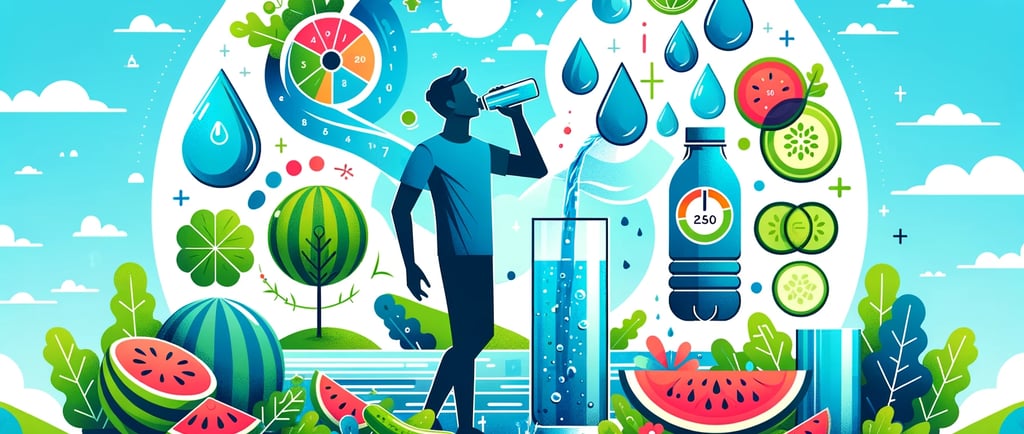How to Properly Hydrate & How Much Water to Drink Each Day
The Importance of Hydration
HEALTH


How to Properly Hydrate & How Much Water to Drink Each Day
Staying properly hydrated is essential for maintaining overall health and well-being. Water plays a critical role in various bodily functions, including temperature regulation, nutrient transportation, and waste elimination. Despite its importance, many people struggle to consume enough water each day. This article provides guidelines on how to properly hydrate and determine how much water you need to drink daily.
The Importance of Hydration
Water is vital for:
Cellular Function: Every cell in the body requires water to function correctly.
Temperature Regulation: Water helps regulate body temperature through sweating and respiration.
Nutrient Transportation: It carries nutrients and oxygen to cells and removes waste products.
Joint Lubrication: Water keeps joints lubricated and helps prevent injuries.
Digestion: It aids in digestion and helps prevent constipation.
How Much Water Should You Drink Each Day?
The amount of water you need can vary based on several factors, including age, sex, weight, climate, and activity level. Here are some general guidelines:
General Recommendations: The National Academies of Sciences, Engineering, and Medicine recommends:
About 3.7 liters (125 ounces) of water per day for men.
About 2.7 liters (91 ounces) of water per day for women.
The 8x8 Rule: A commonly used guideline is to drink eight 8-ounce glasses of water a day, totaling about 2 liters (64 ounces). This is a reasonable goal for most people but may need adjustment based on individual needs.
Listen to Your Body: Thirst is a natural indicator that your body needs water. Pay attention to your thirst cues and drink water when you feel thirsty.
Urine Color: Monitor the color of your urine. Pale yellow urine typically indicates proper hydration, while darker urine suggests you may need to drink more water.
Factors Influencing Water Needs
Physical Activity: Exercise increases water loss through sweat. It's essential to drink more water before, during, and after physical activity.
Climate: Hot and humid weather can increase the need for water as your body loses more fluid through sweat.
Health Conditions: Certain health conditions, such as fever, diarrhea, and vomiting, can increase water loss and require higher water intake.
Diet: High-protein, high-fiber, and high-sodium diets can increase the need for water. Additionally, consuming caffeinated or alcoholic beverages can lead to increased water loss.
Tips for Proper Hydration
Carry a Water Bottle: Keep a reusable water bottle with you throughout the day to make it easy to drink water regularly.
Set Reminders: Use smartphone apps or alarms to remind you to drink water at regular intervals.
Drink Water Before Meals: Having a glass of water before meals can help you stay hydrated and may aid in digestion.
Flavor Your Water: If you find plain water boring, add a slice of lemon, lime, or cucumber to enhance the flavor.
Eat Water-Rich Foods: Incorporate fruits and vegetables with high water content, such as watermelon, cucumbers, oranges, and strawberries, into your diet.
Start and End Your Day with Water: Drink a glass of water first thing in the morning and before you go to bed to stay hydrated.
Signs of Dehydration
It's crucial to recognize the signs of dehydration, which can include:
Thirst: One of the earliest signs of dehydration.
Dry Mouth: Feeling of dryness or stickiness in the mouth.
Dark Urine: Deep yellow or amber-colored urine.
Fatigue: Feeling unusually tired or lethargic.
Dizziness: Feeling lightheaded or dizzy.
Dry Skin: Skin that lacks elasticity or appears dry.
Headache: Dehydration can cause headaches and even migraines.
Conclusion
Proper hydration is fundamental to maintaining good health and supporting bodily functions. By understanding your individual water needs and incorporating simple strategies to increase water intake, you can ensure that you stay adequately hydrated. Remember to listen to your body, monitor your urine color, and adjust your water intake based on activity level, climate, and diet.



